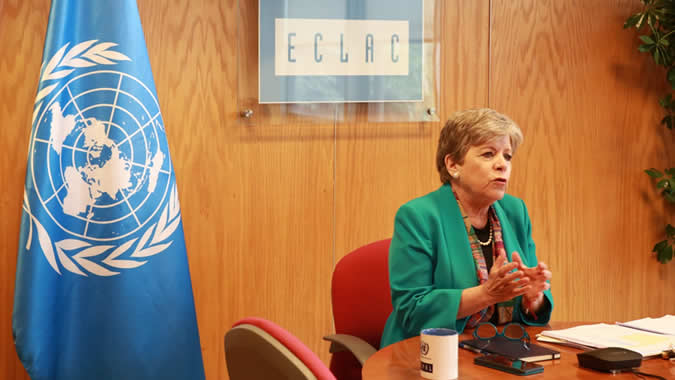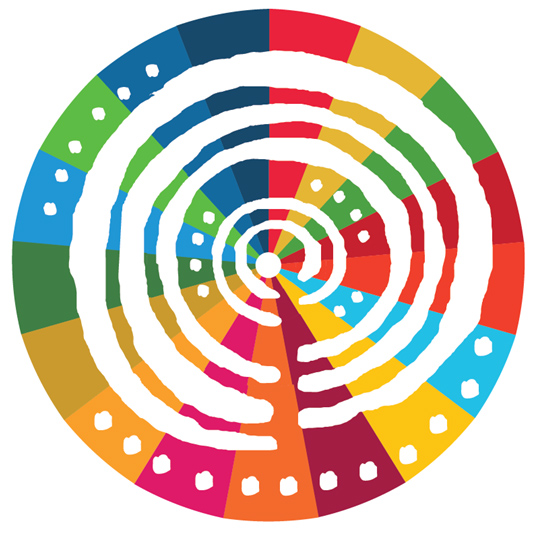ECLAC Presents New Regional Knowledge Management Platform for the Sustainable Development Goals in Latin America and the Caribbean
Work area(s)
Also known as the SDG Gateway, this online portal is the result of a joint effort by United Nations agencies, funds and programs in the region.

The Economic Commission for Latin America and the Caribbean (ECLAC) presented countries with the Regional knowledge management platform for the Sustainable Development Goals (SDG Gateway), developed jointly with the 22 United Nations system’s agencies, funds and programs in the region and which has become a powerful instrument for monitoring the progress and needs of countries with regard to implementing the 2030 Agenda along with advances towards achieving the 17 SDGs.
This online hub for knowledge management has the aim of serving as a meeting and reference point for all information related to the Sustainable Development Goals, including activities, informational resources, statistics, regional data, specific analytical instruments and knowledge products developed and made available by the United Nations development system in the region in response to member countries’ needs.
The platform was presented to the region’s countries on May 17, 2020, during a virtual meeting between Alicia Bárcena, ECLAC’s Executive Secretary, and ambassadors and representatives from 31 countries’ permanent missions to the United Nations.
In her remarks, the regional commission’s most senior representative warned that the 2030 Agenda’s integrality is at risk due to uneven progress on the SDGs, particularly in light of the COVID-19 pandemic; as a result, compacts in strategic and priority sectors are needed to move towards an environmental big push. She also highlighted the importance of this digital platform for follow-up of the 2030 Agenda (under ECLAC’s coordination), the inter-agency and multidisciplinary nature of which is aligned with the Secretary-General’s recommendations.
“As the United Nations Secretary-General, António Guterres, has underscored many times, this is a global crisis that requires global and regional solutions. Improved multilateralism and greater regional cooperation are key to being able to overcome the enormous social and economic impact that the pandemic is having in all countries,” Alicia Bárcena told the diplomatic officials.
She added that the multilateral system must remain strong to focus on building back better, with the aim of attaining the main objective, which is to achieve more egalitarian, inclusive and sustainable societies and economies, with greater resilience to face the emergence of biological risks, climate change and many other global challenges that will stay with us in the near future.
The Regional knowledge management platform for the SDGs provides access to information on the 2030 Agenda, the main intergovernmental forums and regional mechanisms for discussion and coordination linked to its implementation and follow-up in Latin America and the Caribbean; the regional status of the Sustainable Development Goals and their targets, challenges and opportunities, lessons learned and best practices, recommendations and key messages from the region; as well as activities, news, resources and tools for implementing the SDGs.
It also offers detailed information on member countries and various stakeholders: civil society, local governments, parliaments, the private sector, young people, and the UN System. This gateway brings together statistical monitoring on a global, regional and national level, data, indicators, reports on the SDGs, methodologies and informational resources, as well as the main activities, news, publications, videos, infographics, websites and databases related to this issue.
“Our regional commission can offer the mandate, the experience, the tools and the platforms that are crucial for supporting countries on the follow-up and implementation of the 2030 Agenda for Sustainable Development, even during these unprecedented times of pandemic,” ECLAC’s highest authority stated.
Bárcena added that regional cooperation and integration is more important than ever, and it is vital that ECLAC’s subsidiary bodies continue working actively to support the efforts of the region’s countries to cope with the varied and complex challenges that they are facing today and will face in the future.
“The world to come is going to be very different, achieving a more sustainable and egalitarian world depends on what we do today. We have to rethink the future. We must take advantage of the opportunity to move towards a cultural change. We cannot develop at the expense of our natural and human resources. We must bet on new strategic sectors, such as the production of medicines, with more technology. And also aim for an energy transition and more sustainable cities. To achieve that, we need collective action, all of us getting behind this to support the social agenda, for all sectors,” she concluded.
Related content

ECLAC Reaffirms Commitment to Working with and for Latin American and Caribbean Countries on Regional Cooperation and Integration to Tackle Current and Future Challenges in the Face of COVID-19
In a virtual meeting with Latin American and Caribbean countries’ permanent representatives to the United Nations, ECLAC’s Executive Secretary, Alicia Bárcena, presented the actions taken by the…
Type
Country(ies)
- Latin America and the Caribbean
Contact
Public Information Unit
- prensa@cepal.org
- (56 2) 2210 2040
